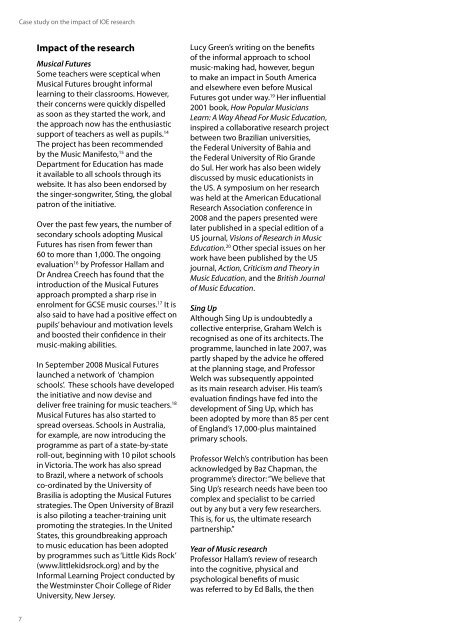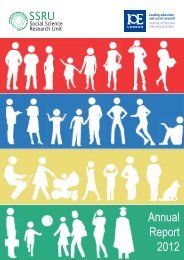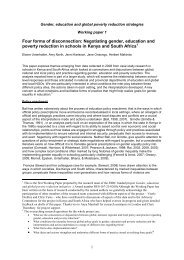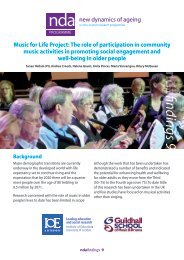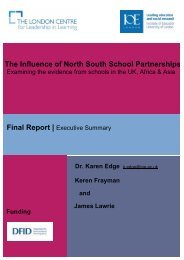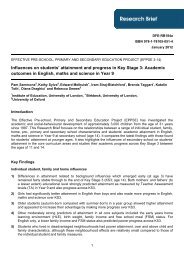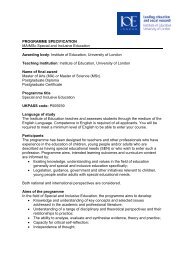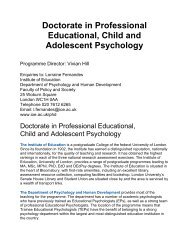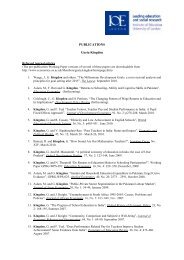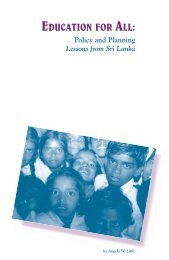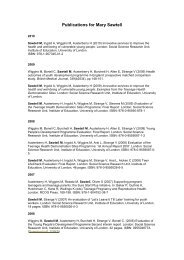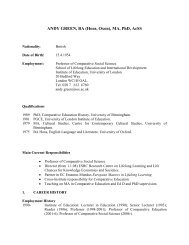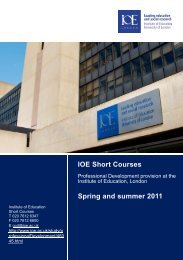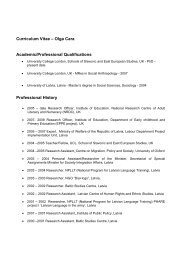Case study on the impact of IOE research Music Education
Case study on the impact of IOE research Music Education
Case study on the impact of IOE research Music Education
You also want an ePaper? Increase the reach of your titles
YUMPU automatically turns print PDFs into web optimized ePapers that Google loves.
<str<strong>on</strong>g>Case</str<strong>on</strong>g> <str<strong>on</strong>g>study</str<strong>on</strong>g> <strong>on</strong> <strong>the</strong> <strong>impact</strong> <strong>of</strong> <strong>IOE</strong> <strong>research</strong><br />
Impact <strong>of</strong> <strong>the</strong> <strong>research</strong><br />
<strong>Music</strong>al Futures<br />
Some teachers were sceptical when<br />
<strong>Music</strong>al Futures brought informal<br />
learning to <strong>the</strong>ir classrooms. However,<br />
<strong>the</strong>ir c<strong>on</strong>cerns were quickly dispelled<br />
as so<strong>on</strong> as <strong>the</strong>y started <strong>the</strong> work, and<br />
<strong>the</strong> approach now has <strong>the</strong> enthusiastic<br />
support <strong>of</strong> teachers as well as pupils. 14<br />
The project has been recommended<br />
by <strong>the</strong> <strong>Music</strong> Manifesto, 15 and <strong>the</strong><br />
Department for Educati<strong>on</strong> has made<br />
it available to all schools through its<br />
website. It has also been endorsed by<br />
<strong>the</strong> singer-s<strong>on</strong>gwriter, Sting, <strong>the</strong> global<br />
patr<strong>on</strong> <strong>of</strong> <strong>the</strong> initiative.<br />
Over <strong>the</strong> past few years, <strong>the</strong> number <strong>of</strong><br />
sec<strong>on</strong>dary schools adopting <strong>Music</strong>al<br />
Futures has risen from fewer than<br />
60 to more than 1,000. The <strong>on</strong>going<br />
evaluati<strong>on</strong> 16 by Pr<strong>of</strong>essor Hallam and<br />
Dr Andrea Creech has found that <strong>the</strong><br />
introducti<strong>on</strong> <strong>of</strong> <strong>the</strong> <strong>Music</strong>al Futures<br />
approach prompted a sharp rise in<br />
enrolment for GCSE music courses. 17 It is<br />
also said to have had a positive effect <strong>on</strong><br />
pupils’ behaviour and motivati<strong>on</strong> levels<br />
and boosted <strong>the</strong>ir c<strong>on</strong>fidence in <strong>the</strong>ir<br />
music-making abilities.<br />
In September 2008 <strong>Music</strong>al Futures<br />
launched a network <strong>of</strong> ‘champi<strong>on</strong><br />
schools’. These schools have developed<br />
<strong>the</strong> initiative and now devise and<br />
deliver free training for music teachers. 18<br />
<strong>Music</strong>al Futures has also started to<br />
spread overseas. Schools in Australia,<br />
for example, are now introducing <strong>the</strong><br />
programme as part <strong>of</strong> a state-by-state<br />
roll-out, beginning with 10 pilot schools<br />
in Victoria. The work has also spread<br />
to Brazil, where a network <strong>of</strong> schools<br />
co-ordinated by <strong>the</strong> University <strong>of</strong><br />
Brasilia is adopting <strong>the</strong> <strong>Music</strong>al Futures<br />
strategies. The Open University <strong>of</strong> Brazil<br />
is also piloting a teacher-training unit<br />
promoting <strong>the</strong> strategies. In <strong>the</strong> United<br />
States, this groundbreaking approach<br />
to music educati<strong>on</strong> has been adopted<br />
by programmes such as ‘Little Kids Rock’<br />
(www.littlekidsrock.org) and by <strong>the</strong><br />
Informal Learning Project c<strong>on</strong>ducted by<br />
<strong>the</strong> Westminster Choir College <strong>of</strong> Rider<br />
University, New Jersey.<br />
Lucy Green’s writing <strong>on</strong> <strong>the</strong> benefits<br />
<strong>of</strong> <strong>the</strong> informal approach to school<br />
music-making had, however, begun<br />
to make an <strong>impact</strong> in South America<br />
and elsewhere even before <strong>Music</strong>al<br />
Futures got under way. 19 Her influential<br />
2001 book, How Popular <strong>Music</strong>ians<br />
Learn: A Way Ahead For <strong>Music</strong> Educati<strong>on</strong>,<br />
inspired a collaborative <strong>research</strong> project<br />
between two Brazilian universities,<br />
<strong>the</strong> Federal University <strong>of</strong> Bahia and<br />
<strong>the</strong> Federal University <strong>of</strong> Rio Grande<br />
do Sul. Her work has also been widely<br />
discussed by music educati<strong>on</strong>ists in<br />
<strong>the</strong> US. A symposium <strong>on</strong> her <strong>research</strong><br />
was held at <strong>the</strong> American Educati<strong>on</strong>al<br />
Research Associati<strong>on</strong> c<strong>on</strong>ference in<br />
2008 and <strong>the</strong> papers presented were<br />
later published in a special editi<strong>on</strong> <strong>of</strong> a<br />
US journal, Visi<strong>on</strong>s <strong>of</strong> Research in <strong>Music</strong><br />
Educati<strong>on</strong>. 20 O<strong>the</strong>r special issues <strong>on</strong> her<br />
work have been published by <strong>the</strong> US<br />
journal, Acti<strong>on</strong>, Criticism and Theory in<br />
<strong>Music</strong> Educati<strong>on</strong>, and <strong>the</strong> British Journal<br />
<strong>of</strong> <strong>Music</strong> Educati<strong>on</strong>.<br />
Sing Up<br />
Although Sing Up is undoubtedly a<br />
collective enterprise, Graham Welch is<br />
recognised as <strong>on</strong>e <strong>of</strong> its architects. The<br />
programme, launched in late 2007, was<br />
partly shaped by <strong>the</strong> advice he <strong>of</strong>fered<br />
at <strong>the</strong> planning stage, and Pr<strong>of</strong>essor<br />
Welch was subsequently appointed<br />
as its main <strong>research</strong> adviser. His team’s<br />
evaluati<strong>on</strong> findings have fed into <strong>the</strong><br />
development <strong>of</strong> Sing Up, which has<br />
been adopted by more than 85 per cent<br />
<strong>of</strong> England’s 17,000-plus maintained<br />
primary schools.<br />
Pr<strong>of</strong>essor Welch’s c<strong>on</strong>tributi<strong>on</strong> has been<br />
acknowledged by Baz Chapman, <strong>the</strong><br />
programme’s director: “We believe that<br />
Sing Up’s <strong>research</strong> needs have been too<br />
complex and specialist to be carried<br />
out by any but a very few <strong>research</strong>ers.<br />
This is, for us, <strong>the</strong> ultimate <strong>research</strong><br />
partnership.”<br />
Year <strong>of</strong> <strong>Music</strong> <strong>research</strong><br />
Pr<strong>of</strong>essor Hallam’s review <strong>of</strong> <strong>research</strong><br />
into <strong>the</strong> cognitive, physical and<br />
psychological benefits <strong>of</strong> music<br />
was referred to by Ed Balls, <strong>the</strong> <strong>the</strong>n<br />
7


